Altötting
Andreas Hykade
2020
| 11 min
2D Animation
Selections and Awards
Best Animation Film Filmschau Baden-Württemberg, Stuttgart, Germany (2020)
Honourable Mention International Film Festival "Etiuda & Anima" (ONLINE), Cracow, Poland (2020)
Craft Award for Best ScriptOttawa International Animation Festival, Ottawa, Canada (2020)
Best Short Animation Ionian Contemporary Animation Festival ICONA (ONLINE), Athens, Greece (2020)
Grand PrizeCinanima International Animated Film Festival of Espinho, Portugal (2020)
Official SelectionAnnecy International Animation Film Festival, Annecy, France (2020)
Official SelectionAnimafest Zagreb – World Festival of Animated Film, Zagreb, Croatia (2020)
Official Competition GLAS Animation Festival, California, U.S.A. (2021)
Official Selection Bucheon International Animation Festival, Bucheon, South Korea (2020)
Official SelectionNew Chitose Airport International Animation Festival, Hokkaido, Japan (2020)
Official SelectionFestival du nouveau cinéma - FNC, Montreal, Canada (2020)
Official SelectionFestival international du cinéma francophone en Acadie – FICFA, Moncton, New Brunswick (2020)
Official SelectionVictoria Film Festival, Victoria, British Columbia (2021)
International Competition – Animation AvantgardeVienna Shorts International Short Film Festival, Austria (2021)
Official Selection – International CompetitionAnimatou – International Animation Film Festival, Geneva, Switzerland (2021)
More Selections and Awards
“You know, when I was a boy, I fell in love with the Virgin Mary.”
In the small Bavarian town of Altötting, a mother takes her young son to visit a nearby chapel. The boy becomes entranced by the Shrine of the Virgin Mary inside the chapel and begins daily pilgrimages to see his beloved Madonna. His love, devotion, and passion for her continue to grow, until one day his world is crushed by the devastating secret behind her eternal beauty. Mesmerizing, haunting, and deeply personal, Altötting is a coming-of-age story about love, faith, mortality, and shattered illusions.
In this poignant and philosophical animated short, acclaimed filmmaker Andreas Hykade (We Lived in Grass, Ring of Fire, The Runt, Love and Theft) interweaves scenes of quiet, spacious minimalism with flourishes of opulent beauty to create a timeless story of lost innocence.
Featuring inspired design by award-winning Portuguese animator/artist Regina Pessoa (Tragic Story with a Happy Ending, Kali the Little Vampire, Uncle Thomas), along with a spellbinding adaptation of Franz Schubert’s Ave Maria by tenor Bernard Richter, Altötting is a co-production between Studio Film Bilder, the National Film Board of Canada and Ciclope Filmes.
“You know, when I was a boy, I fell in love with the Virgin Mary.”
In the small Bavarian town of Altötting, a mother takes her young son to visit a nearby chapel. The boy becomes entranced by the Shrine of the Virgin Mary inside the chapel and begins daily pilgrimages to see his beloved Madonna. His love, devotion, and passion for her continue to grow, until one day his world is crushed by the devastating secret behind her eternal beauty. Mesmerizing, haunting, and deeply personal, Altötting is a coming-of-age story about love, faith, mortality, and shattered illusions.
In this poignant and philosophical animated short, acclaimed filmmaker Andreas Hykade (We Lived in Grass, Ring of Fire, The Runt, Love and Theft) interweaves scenes of quiet, spacious minimalism with flourishes of opulent beauty to create a timeless story of lost innocence.
ONE-LINER & TWO-LINER
Two-liner
“You know, when I was a boy, I fell in love with the Virgin Mary. It happened in a little Bavarian town called Altötting.” Mesmerizing, haunting, and deeply personal, Altötting is a coming-of-age story about love, faith, mortality, and shattered illusions.
One-liner
“You know, when I was a boy, I fell in love with the Virgin Mary. It happened in a little Bavarian town called Altötting.”
STYLE AND ANIMATION APPROACH
Throughout Andreas Hykade’s career, his films have skirted between two strands: a minimalist, almost stick-figure-like style (The Runt, Nuggets, Tom) and a more elaborate and visually explosive design (Love and Theft, Walkampf, Ring of Fire, We Lived in Grass).
Hykade’s most recent film, Altötting, bridges both of those approaches, combining an elegant, minimalist design and sound approach that emphasizes space and silence with moments of dazzlingly detailed opulence (notably in the scene where the Virgin Mary reveals her secret to the man).
In creating these more elaborate scenes, Hykade reached out to Portuguese animator Regina Pessoa, who’s known for her distinctive engraving (or scratch) technique. Hykade first encountered Pessoa’s work in 2000, when his “scratchy” black-and-white film Ring of Fire was touring the festival circuit at the same time as her debut film, The Night. “Festivals often scheduled the two films together,” says Hykade. “So I realized that Regina was the queen of scratch. I retired from scratching to concentrate on simple stick figures. Then, 15 years later, I envisioned Altötting as a kind of prequel to Ring of Fire. So I needed that scratchy thing again, which left me with two possibilities: ripping off Regina and doing a poor man’s version of her technique, or convincing Regina to do the job.”
Fortunately for Hykade, Pessoa agreed to come on board. “I will be forever grateful,” says Hykade. “I needed Regina’s contribution so that she could put her holy scratches on top of the animation. So the result is not stilted scratching but something quite magical and alive, which is exactly what was needed for the film, I think.”
INTERVIEW WITH DIRECTOR ANDREAS HYKADE
Beyond your pilgrimages to visit the Shrine of the Virgin Mary, were you actively involved in the church as a youth?
Yes. I was an altar boy in the little village near Altötting. When I was 12 years old, Pope John II visited Altötting (the first pope to visit Germany in 500 years). The whole town was turned upside down, because television reporters came to record the event. To make sure they would have a nice, symmetrical image for TV screens, they searched for an altar boy of a certain size, which was exactly my size at the time. So they picked me. The pope touched my head, but it had no effect on me.
Did you revisit the Chapel of Grace in Altötting when you started this project? What was the experience like returning there (or to other churches) after many years?
Well, I still go there, probably three times a year, to watch the people and see how the paintings on the wall have changed. For example, there used to be paintings of soldiers with swastikas asking the Virgin Mary for help. They got rid of these paintings and replaced them with awfully painted stuff by students.
Silence and empty space play a big role in Altötting—as they have in some of your more minimalist works (e.g. Nuggets, Tom). In a way, that beautifully captures the power of being inside a church, where it’s that vastness and deep silence that is so overwhelming.
For me, silence is the key to everything. And I’m not only talking about aural silence, I’m talking about visual silence as well: nothing moves. This can create suspense before the action—it can also provide a space for reflection. Besides that, every piece of work seems to have its own natural rhythm. Why is it so important to me? Because I think it is an essential part of filmmaking.
Your early films, We Lived in Grass and Ring of Fire, were big and long and detailed… but later works like The Runt, the Tom series and Nuggets are more restrained. Was there a conscious decision to make ‘smaller’ works that still contained a lot of power and had the impact of the ‘bigger’ films?
I don’t think in terms of big and small. For me, the more intense the better. It’s like pressing a chunk of coal in the hope that it becomes a diamond. One important aspect of Altötting is that it links all the other films together, so it’s quite natural that it combines elements of all the other stuff.
Altötting has a strong connection to your previous films, notably We Lived in Grass, Ring of Fire and The Runt, which are also coming-of-age stories that find the protagonists learning some tough and painful lessons about life. Was your childhood a happy one or filled with disappointments?
It was filled with disappointments. I could not fit in, although I tried hard with football, handball, boxing, swimming, and so on. Nothing worked. And I grew up in a basement—no window. No natural light. So that was kind of grim and isolating. Art became a way out of all that. But “Only Happy When It Rains” is still one of my favourite songs.
You reference your mother in both the film and the end credits. In a way, Altötting seems like a bit of a eulogy for your Mom. When the man hugs the Virgin Mary, it is quite moving, and I kept thinking of a son bidding farewell to his mother.
Well, first of all, it’s a farewell to illusion. This includes a loss of safeness. The goodbye scene symbolizes the human being emancipated from religion and left in a cold place. In a second layer of meaning, the loss of your goddess refers to the loss of a mother. While we were making the film, my mother passed away (the Ave Maria was played at her funeral), so there is this personal layer as well.
Have you reconciled the beauty of the Virgin Mary with the horrific realities of both religion and existence? Once faith is gone, what’s left?
What’s left is the belief that we should transform the power and the beauty of religion into a secular world. Like composing a song that goes “Blackbird singing in the dead of night,” or like making some of these animated films.
Trailer
Images
Loading...
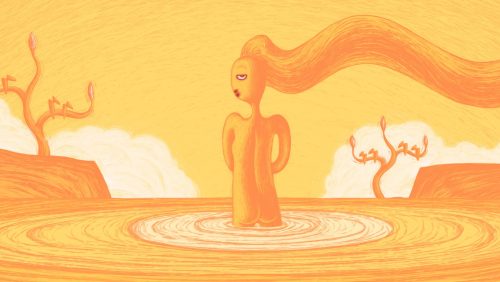
Download
Loading...
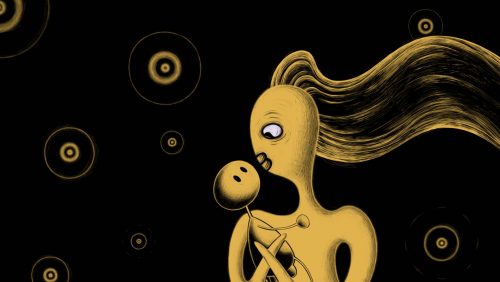
Download
Loading...
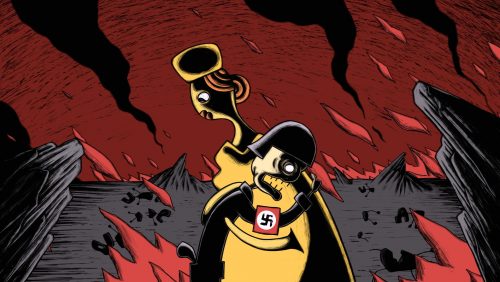
Download
Loading...
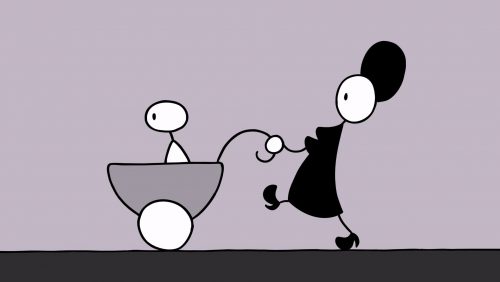
Download
Loading...
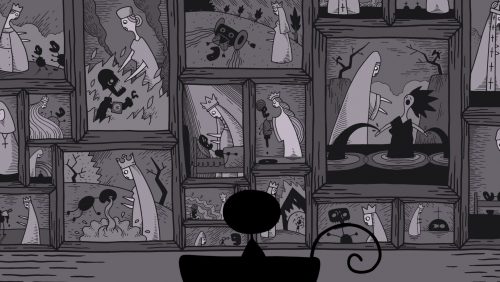
Download
Loading...
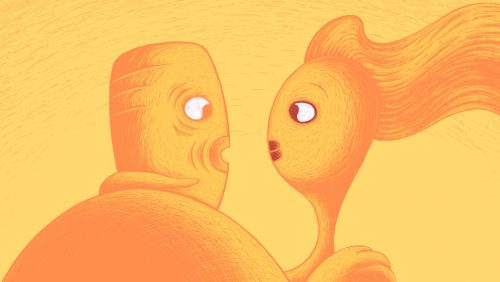
Download
Loading...
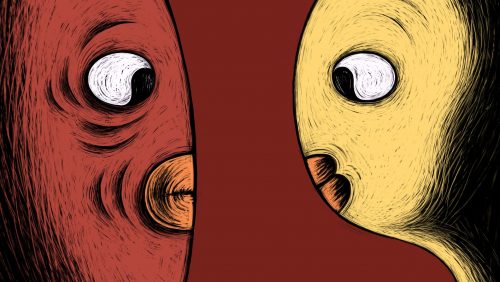
Download
Loading...
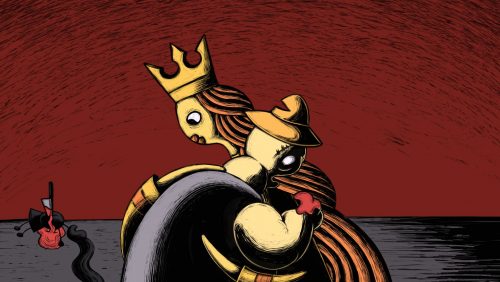
Download
Loading...
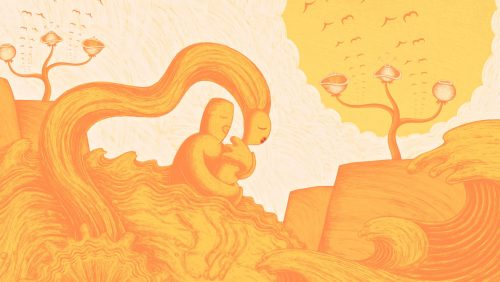
Download
Promotional Materials
Team
Andreas Hykade
Director
Photo
Regina Pessoa
Artistic Director and Painting Supervisor
Photo
Photo : Rene Volfik
Thomas Meyer-Hermann
Producer (Studio Film Bilder)
Photo
Abi Feijó
Producer (Ciclope Filmes)
Photo
Photo : Regina Pessoa
Marc Bertrand
Producer (NFB)
Photo
Photo : Stephan Ballard
Julie Roy
Executive Producer (NFB)
Photo
Credits
Script, Direction, Narration
Andreas Hykade
Design
Andreas Hykade & Regina Pessoa
Assistant Director
Orion Schweitl
Music
Daniel Scott
Tenor
Bernard Richter
Sound Design
Olivier Calvert
Artistic Director and Painting Supervisor
Regina Pessoa
Painting
Regina Pessoa
Sara Naves
André Marques
Alexandre Braga
Animation
Elena Walf
Andreas Hykade
Anselm Pyta
Orion Schweitl
Orchestration and Conducting
Daniel Scott
An adaptation of Franz Schubert’s “Ave Maria”
Musicians
Amélie Benoit-Bastien
Ariane Brisson
Martin Carpentier
Gabrièle Dostie-Poirier
Philippe Dunnigan
Annie Gadbois
Christine Giguère
Annie Guénette
Marcelle Mallette
Madeleine Messier
Elvira Misbakhova
Ligia Paquin
Pierre Pépin
Christian Prévost
Daniel Scott
Julie Sirois
Jocelyn Veilleux
Copyist
Louis Babin
Foley
Lise Wedlock
Foley Assistant
Thomas Garant
Sound and Foley Recording
Geoffrey Mitchell
Voice Recording and Music Mix
Charles-Émile Beaudin
Re-recording
Isabelle Lussier
Technical Directors
Ralf Bohde
Eric Pouliot
Pierre Plouffe
Technical Specialist – Animation
Yannick Grandmont
Technical Coordinator
Jean-François Laprise
Infographics
Ralf Bohde
Cynthia Ouellet
Online Editor
Serge Verreault
Production Manager
Bianca Just
Line Producers
Mylène Augustin
Anne-Marie Bousquet
Studio Coordinators
Laetitia Seguin
Michèle Labelle
Administrators
Diane Régimbald
Karine Desmeules
Senior Production Coordinator
Camila Blos
Accounting
Margarita Garrido
Luís Pereira
Marketing Manager
Geneviève Bérard
In memory of
Anica Hykade
Thanks to
Martin Delisle
Dorothee Silbermann
Maria Silvestre
Siddharth Sinha
David Verrall
With the support of
MFG Baden-Württemberg
Filmförderanstalt Berlin
Instituto do Cinema e Audiovisual
Ministério da Cultura
Executive Producers
Thomas Meyer-Hermann
Abi Feijó
Julie Roy
Producers
Thomas Meyer-Hermann
Marc Bertrand
Abi Feijó
Co-produced by
Studio FILM BILDER
The National Film Board of Canada
Ciclope Filmes
www.filmbilder.de
www.nfb.ca
www.ciclopefilmes.com

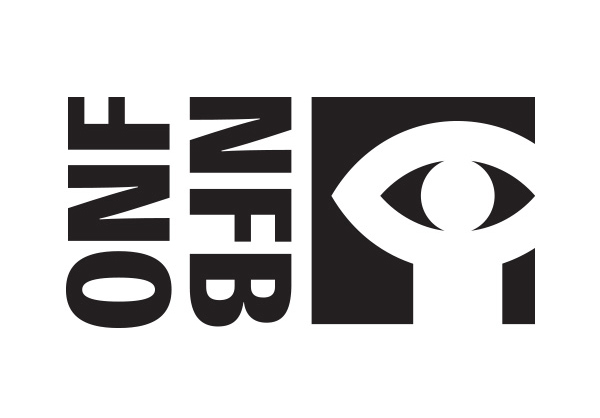

© 2020 Studio FILM BILDER, National Film Board of Canada, Ciclope Filmes
Media Relations
-
About Studio Film Bilder
Studio Film Bilder was founded in 1989 by Thomas Meyer-Hermann. Film Bilder has a long track record of creating innovative short films, music videos, TV series, and features. The studio’s acclaimed body of work has emphasized unique design, original storytelling and a network of close collaborators (including directors like Angela Steffen, Julia Ocker, Gil Alkabetz, Andreas Hykade, and Phil Mulloy). Film Bilder’s commissioned works include animated sequences for the feature film Run Lola Run, animation layout for the animated feature Three Robbers, and animation for Fritzi: A Revolutionary Tale. Aside from producing a number of acclaimed short films, including Rubicon, The Runt, The Final Solution, Nuggets and Love & Theft, the studio has also created three successful children series: Tom and the Slice of Bread with Strawberry Jam and Honey, Patchwork Pals and Animanimals. The studio’s films have won 300 awards, and its YouTube channel, youtube.com/filmbilder, has 750,000 subscribers.
-
About the NFB
The National Film Board of Canada (NFB) is a leader in exploring animation as an artform, a storytelling medium and innovative content for emerging platforms. It produces trailblazing animated works both in its Montreal studios and across the country, and it works with many of the world’s leading creators on international co-productions. NFB productions have won more than 7,000 awards, including seven Oscars for NFB animation and seven grand prizes at the Annecy festival. To access this unique content, visit NFB.ca.
-
About Ciclope Filmes
Ciclope Filmes was founded by Abi Feijó in 2002 to produce auteur animated shorts, particularly those of Regina Pessoa, but the studio has also produced notable work by other acclaimed animators, such as Paul Bush, Andreas Hykade, Marcy Page, and Alice Guimarães and Mónica Santos. Ciclope Filmes has co-produced with many international partners, including the NFB and Blue Dada Productions (Canada), Studio Film Bilder (Germany), Folimage and Les Armateurs (France), Studio GDS (Switzerland) and The Ancient Mariner (UK). Ciclope’s films have won awards at major animation festivals and events such as the Annecy International Animation Film Festival, the Annie Awards, the Hiroshima International Animation Festival, Anima Mundi, Animafest Zagreb, OIAF, SXSW, the Chicago International Children’s Film Festival, SICAF, Cinanima, Monstra and the Sophia Awards.